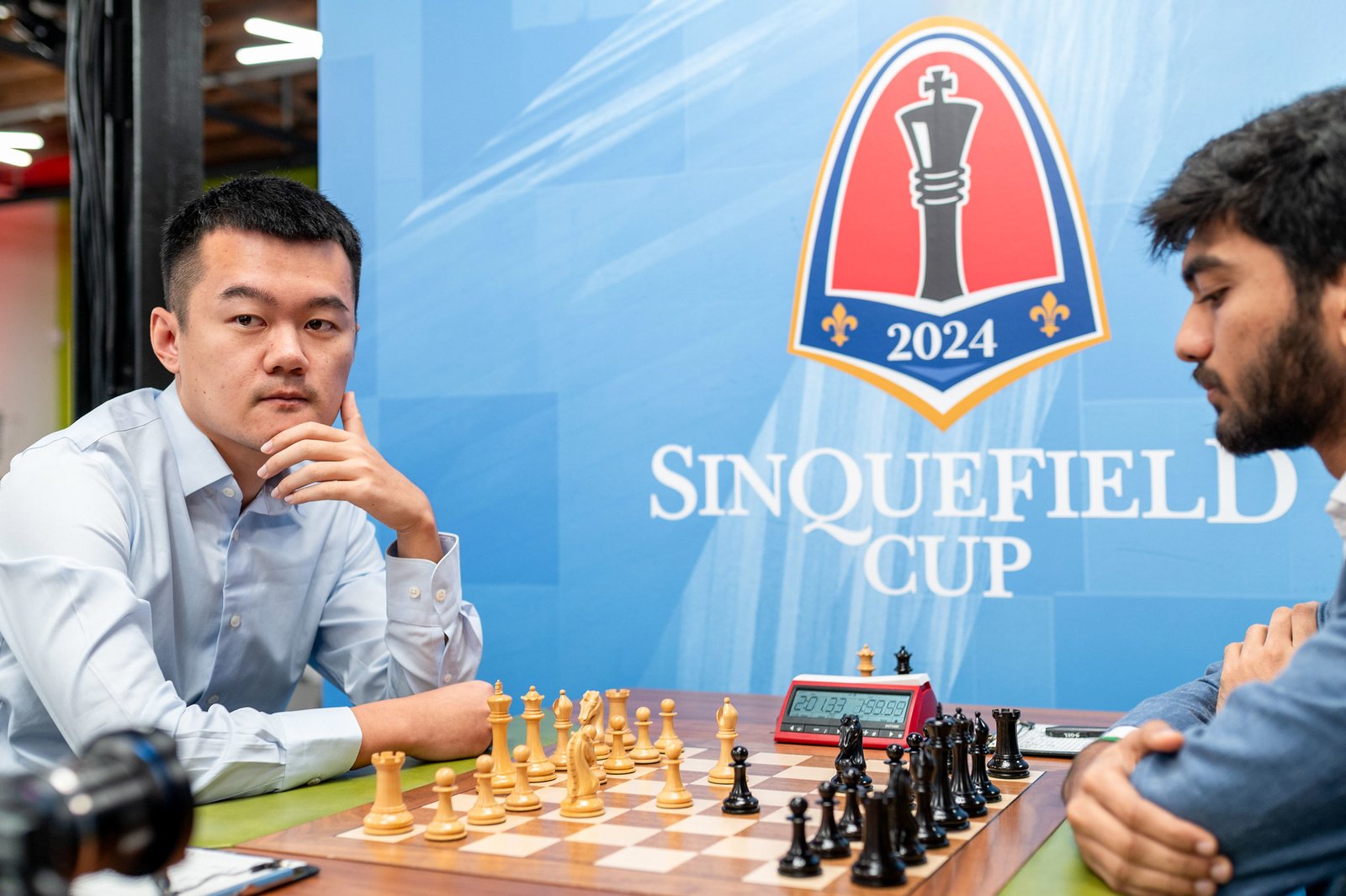Singapore: The chess world was abuzz with anticipation as 18-year-old Indian prodigy Dommaraju Gukesh prepared to take on defending champion Ding Liren at the World Chess Championship in Singapore. Having commenced on November 25, 2024, this historic encounter pits youthful ambition against seasoned expertise, as Gukesh seeks to claim the throne as the youngest world chess champion. His rise to prominence has been as remarkable as it has been rapid, with a story that intertwines talent, dedication, and an unwavering belief in his abilities.
A Defining Moment at the WR Masters
In February 2023, the WR Masters tournament witnessed a pivotal moment that showcased Gukesh’s exceptional character. A three-way tie for first place prompted the organizers to propose a shared championship. While world No. 2 Ian Nepomniachtchi and two-time World Cup winner Levon Aronian were content with this solution, the 16-year-old Gukesh adamantly refused. He insisted on a tiebreaker, a bold move that exemplified his competitive spirit and willingness to face challenges head-on. Aronian, who eventually triumphed in the rapid tiebreaks, later remarked, “He’s so young but doesn’t care if somebody is stronger or more experienced than him. He just wants to shoot for the stars.”

Early Beginnings and Unwavering Determination
Gukesh’s chess journey began in Chennai, a city renowned for nurturing chess talent. As a child, he would accompany his father, ENT surgeon Rajini Kanth, to chess tournaments after school. What started as a way to pass time quickly became a passion. His first coach, V Bhaskar, recognized Gukesh’s potential early on, noting his focus and determination. “He wouldn’t get up until he finished his work. He didn’t mind sitting for hours playing chess,” Bhaskar recalled.
Despite initial losses, Gukesh’s determination never wavered. His father, who continues to travel with him to tournaments, initially knew little about the intricacies of competitive chess. Over time, he became an integral part of Gukesh’s journey, learning about ratings, strategies, and the complexities of the sport.
Strategic Growth and the Role of Engines
Gukesh’s former coach, Vishnu Prasanna, played a critical role in shaping his playing style. In the early stages, Vishnu avoided introducing Gukesh to chess engines, instead focusing on generating ideas and exploring possibilities. They analyzed games between lesser-known engines like SugaR and AsmFish, enabling Gukesh to grasp innovative strategies. “Engines are more innovative and less prejudiced than humans,” Vishnu explained, highlighting how these exercises expanded Gukesh’s understanding of the game.
When engines were eventually incorporated into his training, Gukesh’s style evolved. He embraced aggressive openings and sharper tactics, becoming a player unafraid to take risks. This adaptability and hunger for improvement have been instrumental in his meteoric rise.
The Candidates Tournament and Olympic Glory
In 2024, Gukesh made history by becoming the youngest-ever winner of the Candidates Tournament, securing his spot in the World Championship. His performances at the Chess Olympiad further solidified his reputation as a prodigious talent. His game against Wei Yi, marked by strategic brilliance and a series of accurate moves in the endgame, exemplified his resourcefulness and killer instinct.
Gukesh’s calculation skills have drawn admiration from top players, including world No. 1 Magnus Carlsen. Levon Aronian praised his willingness to tackle challenging positions, describing him as part of the “new age of chess” that prioritizes ambition and innovation.
Preparing for the Big Stage
Gukesh’s ascent has been accompanied by a rigorous training regimen. Working closely with his second, Grandmaster Grzegorz Gajewski, and other team members, he has honed his openings and prepared for the nuances of match play. The World Championship, spanning 14 classical games, demands not only technical skill but also mental resilience.
Ding Liren, the reigning champion, presents a formidable challenge despite recent struggles. The Chinese Grandmaster, known for his deep understanding and strategic acumen, has an edge in head-to-head classical games, having defeated Gukesh twice. However, his form has dipped since winning the title in 2023, with only 12 wins in 79 classical games. In contrast, Gukesh has participated in 221 games during the same period, achieving 90 victories and gaining 99 rating points.

The Clash of Styles
The upcoming match promises a fascinating clash of styles. Gukesh’s strengths lie in his deep calculations and ability to find winning moves in seemingly drawn positions. His aggressive approach and willingness to embrace unconventional strategies set him apart. On the other hand, Ding’s preparation and positional play have historically been his greatest assets. Observers expect a mix of traditional openings and offbeat strategies as both players strive to outmaneuver each other.
The Stakes and Historical Significance
For Gukesh, this match is more than a quest for the title. It represents an opportunity to etch his name alongside legends like Viswanathan Anand, India’s first world chess champion. A victory would not only make Gukesh the youngest world champion but also affirm India’s growing prominence in global chess.
For Ding, the stakes are equally high. As China’s first world champion, he carries the weight of his country’s expectations. A win would cement his legacy and silence doubts about his recent form.
A Nation’s Pride
Gukesh’s journey has captured the imagination of chess enthusiasts and casual fans alike. His rise reflects the transformative impact of India’s chess ecosystem, which has produced a steady stream of talent in recent years. With the likes of Viswanathan Anand mentoring young players and initiatives to promote the sport at grassroots levels, India is emerging as a powerhouse in the chess world.
Setting a Precedent
The World Chess Championship, inaugurated in 1886, is the pinnacle of competitive chess, showcasing exceptional talent and strategic brilliance. Wilhelm Steinitz, the first official champion, laid the foundation of modern positional play. Emanuel Lasker, his successor, held the title for 27 years (1894–1921), the longest reign in history.
José Raúl Capablanca, known for his impeccable endgame skills, succeeded Lasker in 1921, followed by Alexander Alekhine, who brought an aggressive, tactical style. Alekhine’s reign was interrupted briefly by Max Euwe in 1935, but he reclaimed the title in 1937. Post-World War II, Mikhail Botvinnik dominated, establishing the Soviet Union as a chess superpower. Botvinnik’s era saw fierce rivalries with Vasily Smyslov, Mikhail Tal, and Tigran Petrosian.
Bobby Fischer’s victory in 1972 marked the first American triumph and the height of the Cold War chess rivalry. Anatoly Karpov and Garry Kasparov followed, with Kasparov’s reign (1985–2000) heralding the computer age. Viswanathan Anand became India’s first champion in 2000, inspiring generations of players.
In recent years, Magnus Carlsen dominated from 2013 to 2023 with his versatile style and psychological edge, setting new standards. Now, as young talents like Gukesh emerge, the legacy of these champions continues to inspire the chess world.
As the World Championship looms, the stage is set for an epic showdown between D Gukesh and Ding Liren. The young prodigy’s fearlessness and determination have brought him to the cusp of greatness. Whether he triumphs or falls short, Gukesh’s journey serves as a testament to the power of ambition, hard work, and unwavering belief. The chess world watches with bated breath, ready to witness history in the making.









